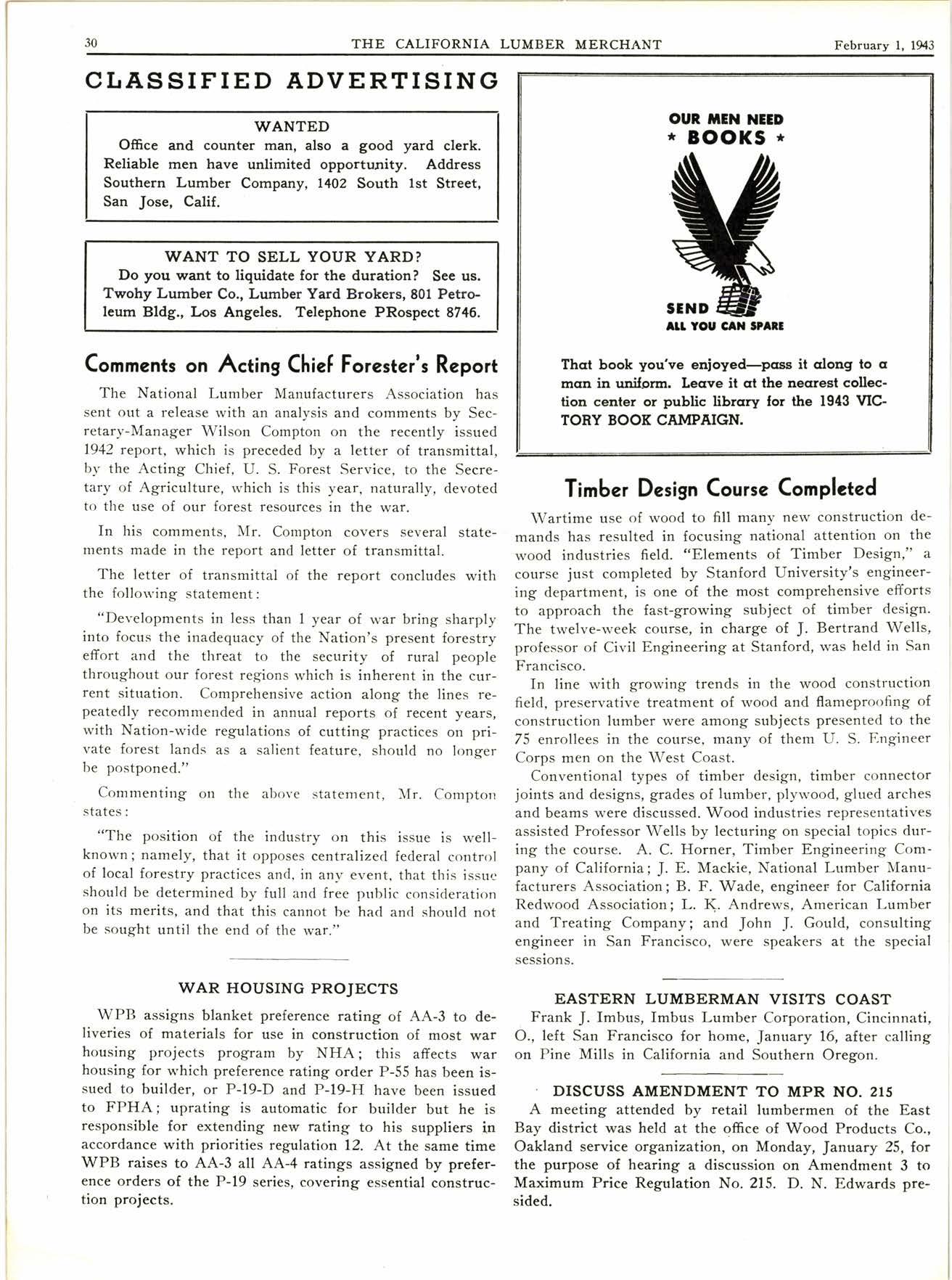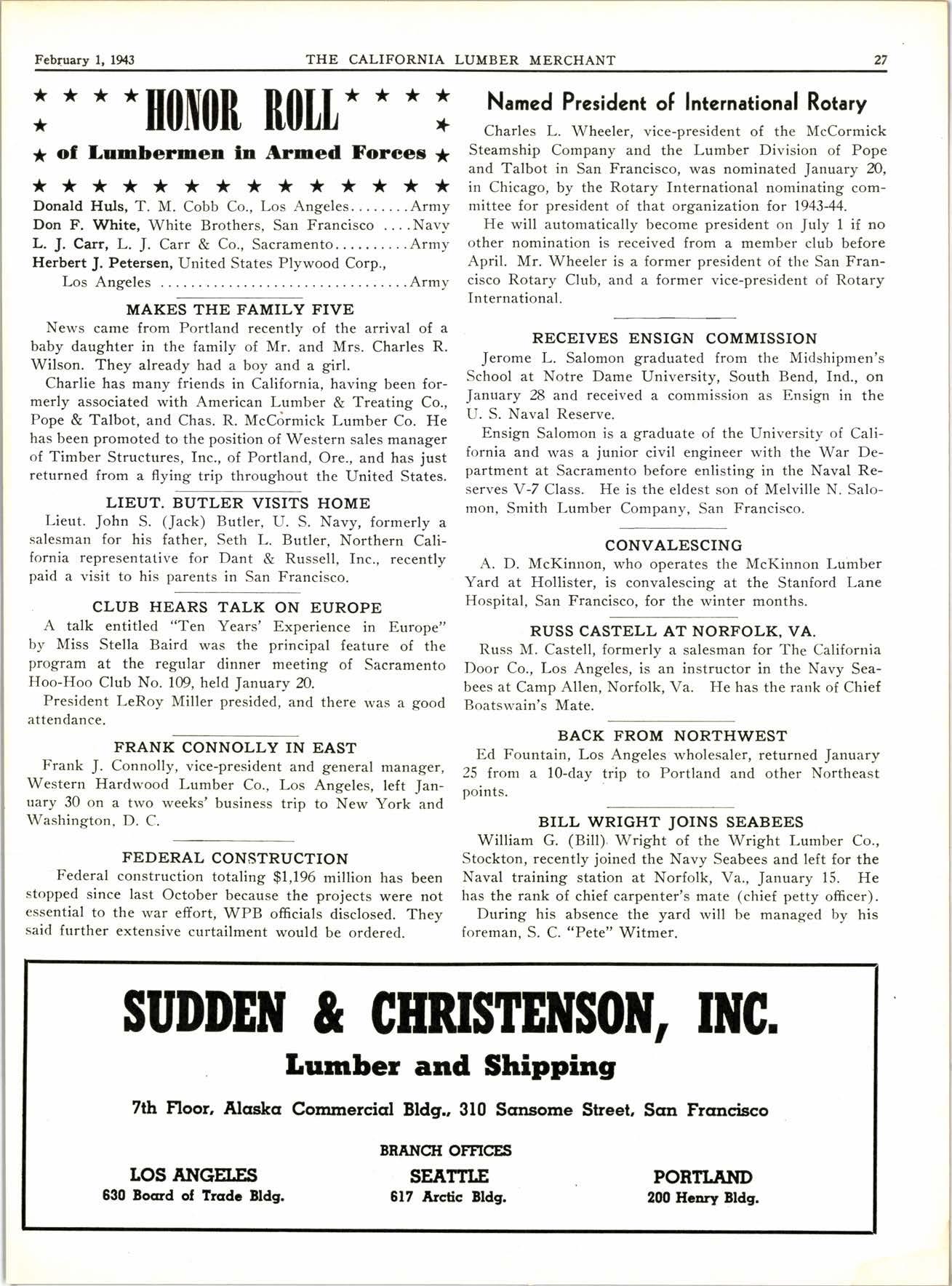
7 minute read
Conservation Order M-208 Revised
Washington, January 13.-A revised and simplified order governing the marketing and distribution of softwood lumber was announced today by the Lumber and Lumber Products Division of the War Production Board. Extensive changes are made in the pattern of preference ratings for lumber to facilitate an orderly flow of materials through regular trade channels into the hands of consumers who require lumber for repair, maintenance and other necessary purposes.
Conservation Order M-208, as amended by the Director General for Operations, establishes four categories of uses of lumber based on the relative importance of these uses in the war program. The new simplified use classifications take the place of Class 1, 2, 3 and. 4 orders for lumber as established in the previous version of M-208.
Attached to the revised order are four lists carrying preference ratings for specified uses including the following:
List A, Preference Ratings AA-2X: Lumber used for maintenance or repair of Government buildings, structures and war projects; for repair and maintenance of railway rolling stock and industrial plants or other premises engaged in war production; for boxing, crating, packing or stou'ing, for shipping any material ordered for the account of the Got'ernment, or to be incorporated in materials ordered by the Government.
List B, Preference Rating AA-3: Lumber for construction of buildings and structures for industrial use; for maintenance and repair of industrial plants, machinery and equipment used in civilian establishments; for crating, boxing, packing and stowing many kinds of industrial goods, foodstuffs and other essential civilian supplies.
List C, Preference Rating AA-4: Lumber to be physical- ly incorporated into ecluipment such as vehicles, tanks and vats; for farm buildings and structures and for storage facilities for agricultural products.
List D, Preference Rating AA-5: Lumber for maintenance, repair, crating or packing of less essential structures and products; for physical incorporation in ladders, refrig- erators and mill rvork.
Special recognition is given to the urgent needs of farmers through assignment of high preference ratings for the use of lumber for repair and maintenance of farr4 build_ ings and other farm uses. Ability of farmers to increase' the yields of subsistence crops will depend in part on prop_ er maintenance of farm plants. and lumber is accordingiy "" important factor in the increasing of .foodstuffs.
It is also hoped that the revised order will provide for filling essential needs of other civilian and industrial consumers of lumber for repair and maintenance. Stocks in re_ tail lumber yards have been seriously depleted during the last year beiause Amendment No. 1 of the former irder prohibited replacement in inventory of soft wood lumber delivered in class 3 and class 4 orders. The revised M-zog removes this restriction so that present levels of inventories may be maintained. It will permit replacement in inventory of all lumber delivered after January 12, regardless of the preference rating under which the lumber is sold. This change is expected to be particularly helpful in maintaining inventories of dealers furnishing lumber for the farm trade.
The order also previously contained an inventory limitation which permitted dealers to have only a 6Gday supply of lumber in stock, although it was recognized that lumber yards in rural communities could not function satisfactorily on that basis, since their turnover is very low. The restriction was adopted as a temporary expedient because of the urgent and critical need for lumber for war purposes. This 60-day limitation on inventories is now eliminated.
The amended M-208 will apply hereafter to that portion of the output of Douglas fir lumber which is not wanted by the central procuring agency for military use. Such lumber, when released by WPB on Form PD-423, will be distributed on preference ratings through regular trade channels. Limitation Order L=218 covering Douglas Fir is amended simultaneously to permit disposition of the nonmilitary Douglas Fir lumber.
While the revised M-208 does not in itself allow dealers generally to build up stocks, dealers whose inventories have been depleted may file an appeal on Form PD-IX, and an analysis of their sales during the preceding 90 days, as shown on PD-IX, will then be used as a basis of assignment of preference ratings for replenishment of inventories r,vhere necessary.
M-208, as amended, is effective immediately. However, deliveries rated before January 12 are subject to the terms of the order before the present amendment. Under this provision, ratings of AA-2X or higher applied under the previous version of the order may be extended, but the revised order provides that ratings of AA-3 or lower may not be extended for replacement in inventorv of softu,ood lumber shipped or delivered before January 12.
L. J. CARR IN SERVTCE-BrLL DUNNTNG WILL HANDLE SALES
L. J. Carr, president and sales manager of L. J. Carr & Co., Sacramento, has been commissioned a Captain in the Army Transport Service and reported for duty at Fort Mason, San Francisco, on January 18.
W. D. (Bill) Dunning of Los Angeles, who represents the firm in Southern California, is now in Sacramento and will handle the sales during Mr. Carr's absence. Mr. Dunning will continue to keep his Los Angeles office open ancl plans to spend some time each month calling on his customers in the Southern California territory.
MGM Relecges Picture 'lVood Goes Tire In:pection Drte for Commercial to \(/ar"

Metro-Goldwyn-Mayer will release between January lSth and February lst a new one-reel technicolor film, "W'ood Goes To \ff21"-3 nine-minute, 35 mm. short, produced by James A. Fitzpatrick, which highlights the service of the forests in supplying Uncle Sam with a multitude of essentials for the war effort.
This motion picture illustrates how the production soldiers of the woods and mills back up front line fighters by providing the materials necessary to shelter them during training in America and to garrison them on foreign soil.
It illustrates hou' the forests build most of the small patrol, auxiliary, and assault watercraft and how forest byproducts produce explosives. It shows how lumber is used for bridges, planes, battleship decking, truck bodies, hangars, and as crating material for food and fighting supplies being shipped to our own forces and our allies all over the world. This picture proves that wood is winning service stripes on the fighting front, as well as behind it.
All forest industry people will not only want to see the movie, "Wood Goes To War,,, but will want it exhibited in the theatres of their communities. This can be arranged by asking the manager of the local theatre to secure a booking through the agency which handles MGM produc_ tions.
MGM's release service covers practically the entire United States, and it is estimated thai an audience of about 15,000,000 people will have a chance to see this picture.
Vehicleg Postponed
San Francisco, Jan. l2-Operators of commercial motor vehicles in the West today were advised by the Office of Defense Transportation that the final date for the first tire inspections has been postponed from January 15 to February 28.
After the first inspection is made, the vehicle must then be presented for regular inspections every 60 days or every 5,000 miles, whichever occurs first. All inspections must be made by inspectors designated for this service by the Office of Price Administration.
If the tire inspector finds the vehicle's tires in good condition he endorses the certificate of war necessity. Certificates which do not have this valid endorsement cannot be used to obtain gasoline ration coupons from local War Price and Rationing Board.
No commercial motor vehicle may be operated following a tire inspection unless the inspector has certified that all reasonable and possible adjustments, repairs or replacements necessary to assure maximum conservation of the vehicle's tires have been made.
The ODT urged that commercial vehicle ,operators begin having tires inspected at once and not wait until the cleadline approaches.
A. M. SCHWARZ CALIFORNIA VISITOR
A. M. Schwarz of the Schwarz Lumber Co., Miami, Ariz., has recently been on a visit to Santa Barbara and Los Angeles.
BV lacJ, Saatn
Age not guaranteed---Some I havc told for 2O years---Some Less
Maybe He Could Tell bv Lookins
Lots of war stories going the rounds, many of them dealing with the subject of dumb rookies.
They say that Tillie the Toiler at Lockheed's says that there is only one thing worse than a dumb rookie, and that's a dumb rookie with bad breath.
Anyway, here is the story of a rookie who was raised within sight of the Atlantic Ocean. When he got in the army they sent him to California, and so one day he stood on a blufi and looked for the first time on the broad waters of the Pacific Ocean. One of his companions said to him:
"Do you know, the Pacific Ocean is three times as big as the Atlantic Ocean?"
Rod Hendrickson Busy On Radio
Rod Hendrickson, former San Francisco lumberman, but now and for many years past a well known figure in the radio world is kept busy these days. He is on the air Monday through Friday on station KGO at 12:45 p-m' with a daily talk in which he dispenses homespun philosophy to an organ accomPaniment.
Rod is radio editor of the San Francisco Argonaut, and has a half-hour Argonaut program on KGO every Sunday at I :30 p.m. He is also in demand for acting roles in various screen dramas because of his ability as a chafacter actor.
Transferred To San Francisco
E. G. (Dave) Davis, of the sales department, IJnion Lumber Co., has been transferred from the mill at Fort Rragg, Calif., to the San Francisco offrce.
This rookie stood on his tip-toes so he could get a good look out over the great western water, and said: "Sure is, ain't it?"
{<*{.
Reminds me of the story we used to tell during the first World War about the colored soldier from the interior of Alabama who had never seen any water wider than a creek until the army caught him and took him to the Eastern seaboard, and he found himself looking with wide eyes out over the Atlantic Ocean. He was heard to remark: "Dass de fustest thing I evah seed in my life dey wuz enuf of."
McCORMICK MILL HAS NEW SITE
Charles R. McCormick, Jr., president of McCormick Piling & Lumber Co., Portland, reports that his company has moved one of its mills from Coburg, Ore., to Fox Valley, near Lyons, Ore., on the Southern Pacific. The mill started cutting Douglas Fir orders January 11. The cut will be about 50,000 feet per day, running two shifts. In the new location the company has acquired enough timber for several years' operation, and the mill has an excellent log pond holding a million feet.

Aberdeen Executives Visit California
Ed P. Schafer, sales manager, Schafer Bros. Lumber & Shingle Co., and V. A. Nyman, manager, Aberdeen Plywood Corporation, Aberdeen, Wash., recently spent about 10 days in San Francisco and Los Angeles on business.










